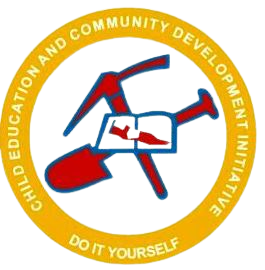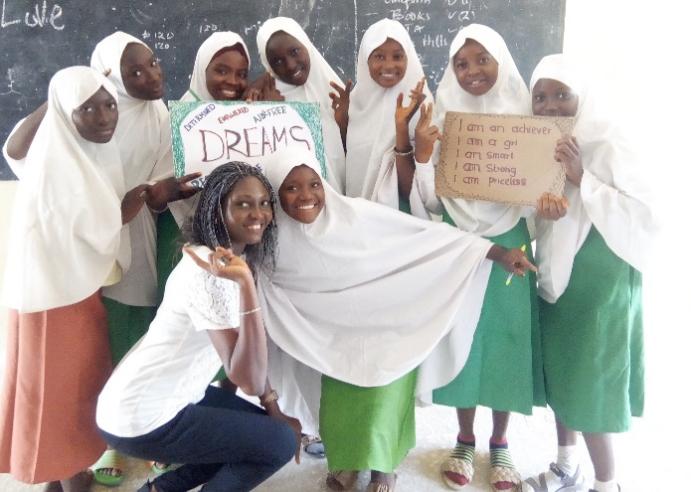DREAMS LIKE: CECDI Partnership with Institute of Human Virology-Nigeria (IHVN) To Reduce HIV/AIDS In Adolescent Girls and Young Women in communities of Keffi, Nasarawa and Karu Local Government of Nasarawa state
The DREAMS LIKE (Determined, Resilient, Empowered, AIDS-free, Mentored and Safe) partnership is aimed at reducing the rates of HIV among adolescent girls and young women (AGYW) in communities of Keffi, Nasarawa and Karu Local Government Area of Nigeria. The program was supported by IHV-Nigeria through CDC to ensure CECDI trained Adolescent Girls and Young Women to have the full knowledge of HIV and life skills to reduce the risk of Adolescent girls and young women to new HIV infections. However, the program started in the year 2020 and so far in the mentioned LGAs, CECDI has so far trained 54 adolescents and 125 AGYW in those LGA. In addition to the packages contained in the curriculum of AGYW program, the girls were sensitized on developing financial skills during their forum where money management, budget and the differences between needs and wants are clearly outlined to ensure that AGYW contributes to the financial status of their family and for self-empowerment and development emphasizing that careers have no gender, as well educating their peers on the knowledge acquired thereby reducing poverty in the family and the community circle. poverty reduction by empowering those girls in the area of gender-based violence, Child Protection knowledge is included in the curriculum to sensitize the girls on the risky behaviors they should avoids because prevention is better than cure.

Some of the factors that led to the increased in the number of girls being reactive include: high levels of risky behaviors such as low educational attainment, gender inequality and harmful social norms, higher school drop-out rates of girls, alcoholism and drug abuse, unprotected sex, frequent change of sexual partners, sex for financial gain, sex to relieve stress, sex because of peer pressure and casual sex as part of socializing; which contributed to their vulnerability to HIV and a life not lived to its full potential. The DREAMS LIKE implementation covers two components of packages of services; Violence Prevention and Economic Strengthening and also aimed at the following:
- Mobilize communities for change with school- and community-based HIV and violence prevention;
- Reduce risk of sex partners through PEPFAR programming, including HIV testing, treatment, and voluntary medical male circumcision;
- Strengthen families with social protection (education subsidies, combination socioeconomic approaches) and parent/caregiver programs and
- Empower adolescent girls and young women and reduce risk through youth-friendly reproductive health care and social asset building;
2021/2022 Achievements
- CECDI contributed to supporting 39 adolescent girls and young women through the DREAMS program, an increase from 50 adolescent girls and young women ages 10-17 years in DREAMS at the beginning of the fiscal year.
- 1,808 AGYW (ages 10-17), across the PEPFAR DREAMS program, completed at least one prevention service, the complete primary package, or the primary package plus a secondary service; CECDI contributed to reaching 1,891 of these AGYW
CECDI empowered 85 young girls and AGYW with skills acquisition of their choice to enable them have business doing to support themselves.
Mobilize Communities for Change and stakeholders’ engagement: as part of CECDI mandate and interventions aimed at educating communities on AGYW, including boys and young men, and mobilize communities for change to keep girls HIV free and safe from violence. School-based HIV and violence prevention: the DREAMS LIKE programs delivered school-based HIV and violence prevention in order to provide accurate information, provide referrals to health centers for services and also provided in school young girls with the capacity to build prevention skills among large numbers of young people in a community.

Community mobilization/norms change: Community mobilization provides an essential support framework for HIV prevention programs and engages boys/men, community leaders and the broader community in addressing social norms that increase HIV risk for AGYW. Community mobilization efforts in related areas, like GBV prevention, have shown a significant impact on norms change, a decrease in violent victimization and perpetration, and an increase in empowerment. Advocacy were also conducted to community leaders/ opinion leaders/head of schools, in community dialogs about HIV, gender norms, sexuality, relationships and decision-making. This was done to ensure community ownership of the program and for school’s principals to continue with the DREAMS program in schools’ health education programs.

PARENTING SKILLS TRAINING REPORT
This report entails what was covered during parenting skills community training with caregivers in Keffi, Nasarawa and Karu LGAs of Nasarawa state. The program aimed to equip parents with skills to raise their children in an acceptable manner taking into consideration the children’s rights as well.
CECDI recorded 3,326 (M 263; F 3,063) caregivers in the program and 122 sessions were conducted and carried out in the 3 LGAs and there was increased in the understanding of the program by caregivers during the parenting skills programing by the organization. However, CECDI ensure that the parenting session goes in line with global best practice. During the program evaluation, CECDI recorded a lot of impact and successes as some of our beneficiaries shared their achievement:
Hadiza Adamu (NAS/KEF/CEC/0370) expressed her joy on how the program has transformed her children, that she usually asks them on what they were taught in their club meeting as she was guided to probe during parenting meetings and the children use to tell her how they were educated on sex education and how to protect themselves from unwanted advances which she is quite pleased with.
Ummukulsun Aliyu (NAS/KEF/CEC/0373) said she was married as a housewife without engaging in any venture that will be of support to her family economically. She was convinced that the husband’s effort needs a complimenting from the side of the wife. She said although her husband never complained but she knows he is feeling the burden of catering for the family’s need alone. She asked of her husband’s consent to start up a small-scale business and he consented to it. Ummukulsun said “I started the business with 10,000 Naira and makes profits of 3,000 Naira”. Thanks to CECDI for the knowledge on sensitization of family economic stability and financial education.
Prior to CECDI intervention through better parenting meeting, we noted that some caregivers paid little or no attention to their children’s welfare in school, whether they attend classes or not, taking their assignment seriously is unknown to the caregivers provided the children goes to school. Odibas Grace (NAS/KRU/CEC/426) was one of such caregivers. However, with the knowledge of parenting skill acquired reverse is the case now, her children take their studies seriously knowing that she will check their work. This has improved the children performance in school and has given the kids a sense of importance in the family.
CECDI noted during home visit that Mercy Ijor (NAS/KRU/CEC/5680) often yell and beat her children at a slightest provocation. She was counseled to understand that since yelling and beating kids do not yield any positive result, why not try other alternatives like grounding and withholding privileges. She was also told that if children are used to beating, they will be hardened and may not obey her anymore, they will say after all, it is just beating. She was educated that if children misbehave, should she ask why. Is it that they do not understand the instruction given or they are worried about something? She was educated that a child need attention and should be given a safe space where they can express themselves and be properly guided to be what they want to be in life. Mercy was also conscientized of the communication gap between her and the children which she promised to use the methods suggested to her, that all she wanted is to see her children well behave. During our monitoring visit, Madam Mercy testified that the methods of discipline suggested to her is effective and it is yielding result because she noticed that her children are more worried when their movement or play is restricted and she always reminds them that privileges to play, visit friends comes with responsibility. She appreciates CECDI for the knowledge to correct the gaps in her parenting style. Mercy added that because of the importance of the knowledge she acquired to better the lives of children in the community, she seizes every opportunity she has to sensitize caregivers on better parenting.
Parents or caregivers, and families often need support to enable them fulfill their roles, especially, if they are burdened by risk factors, while recognizing that parents have the primary responsibility of building resilience in their children enhanced by protective factors which include; nurturing connection of a caregiver who provides consistent love, care and protection; good sense of identity, clear daily routines, education and economic opportunities; faith in a higher being, participation in community and family events, access to health care or basic needs. Caregivers who are equipped with the knowledge and skills during the program promoted their young children’s health beyond mere survival, encourage cognitive development and support their social and emotional wellbeing.
Parenting activity report really indicated improved parenting interaction, behavior, knowledge, beliefs, attitudes and practices, amongst children aged 0 – 17 years under the caregivers’ guidance.

